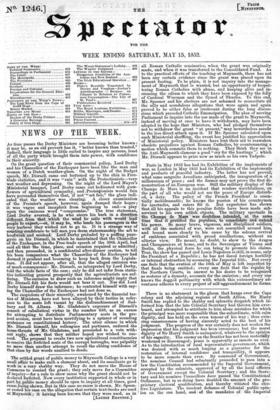NEWS OF THE WEEK.
As time passes the Derby Ministers are becoming better known : • it may be as an old proverb has it, "better known than trusted."
.Indeed, theidenguage is little suited to inspire any persons least of all the party which hi:ought them into power, with conidence
in their sincerity. • • On the great question of their commercial policy, Lord Derby and his Chancellor of the Exchequer have been like the man and • woman of a Dutch weather-glass. On• the night of the Budget
'speech; Mr. Disraeli came out buttoned up to the chin in Free- -trade statistics, and it was "rain with the Protectionists—very 'wet weather and depressing. On the night of the Lord Mayor's Ministerial banquet, Lord Derby came. out bedizened with gum- flowers of agricultural sympathy, and-Protectionists would fain 'hive persuaded themselves that, if not" set fair," the glass indi- cated that the weather was clearing. A. closer examination of the Premier's speech, however, again damped their hopes ; it was vague and inexplicit from beginning to end—a play upon the ominous word "compromise." The true statesman, Lord Derby averred, is he who steers his bark in a direction different from that which the wind he sails with would lead people to expect,—or, it may be, who lands his passengers in the very harbour they wished not to go to. It is a strange way of courting confidence to tell men you deem statesmanship the art to hoodwink and mislead.' Lord'Derby preluded by a puffing pane- gyric on his Disraeli, in which he maintained that the Chancellor of the Exchequer, in the Free-trade speech of the 30th April, had said all that the time, place; and occasion required or admitted; and then proceeded, in a confidential after-dinner oration, to tell his boon companions what the Chandelier of the Exchequer had deemed it prudent and becoming to keep back from the Legisla- ture. It did not appear, after all, that the alleged omission was of much consequence : Mr. Disraeli, as interpreted by Lord Derby, told the whole fads' of the case ; only he did not infer from statis- tics indicating general prosperity that the agriculturists are suf- fering. The omission to draw such an inference might imply that Mr. Disraeli felt his facts would not bear it out. .Nor did Lord Derby himself draw the inference; he contented himself with say- ing the Chancellor of the Exchequer had not done so. The sitspieiods of their sincerity, awakened by the financial tac- tics of -Ministers,-have not been allayed-by their tactics in refer- ence to the seats left 'vacant by the disfranchisement of Sud- bury and St. Albans. - Mr. Gladstone's exposure of Disraeli's conceit of cabelistical virtue in the number 658, as an excuse for. attempting to distaibiite Parliamentary seats in the re- sent session; must have been mortifying to a spinner of scam mg sentences on constitutional. history.' The utter silence in whioh Mr. Disraeli himself, his colleagues and partisans, endured the home-thrusts of . Mr: Gladstone, and proceeded to a vote with- out reply, shows that they neither hoped nor wished to 6t10- teed. The proposal to create two new agricultural constituencies to receive the forfeited seats of the corrupt boroughs was palpably no more than another attempt to recall the ebbing confidence of that class by fair words unshed to deeds.


























